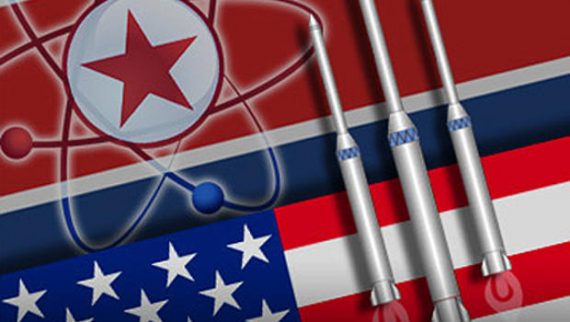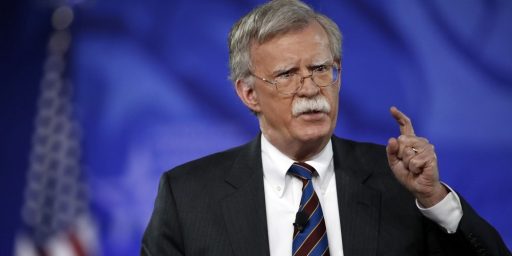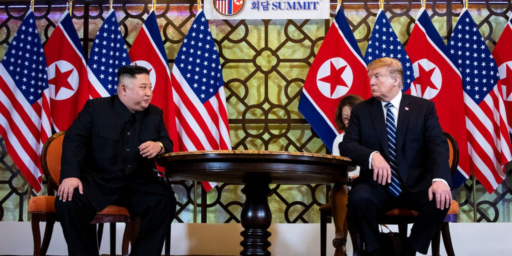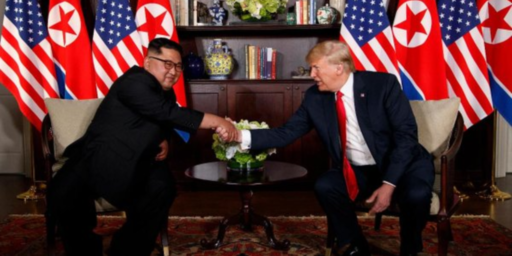John Bolton Is Foolishly Calling For Preemptive War Against North Korea
John Bolton is leading a cry for preemptive war against North Korea.
John Bolton, who served as United States Ambassador to the United Nations under former President George W. Bush, has an Op-Ed in The Wall Street Journal calling for pre-emptive war against North Korea:
Pre-emption opponents argue that action is not justified because Pyongyang does not constitute an “imminent threat.” They are wrong. The threat is imminent, and the case against pre-emption rests on the misinterpretation of a standard that derives from prenuclear, pre-ballistic-missile times. Given the gaps in U.S. intelligence about North Korea, we should not wait until the very last minute. That would risk striking after the North has deliverable nuclear weapons, a much more dangerous situation.
In assessing the timing of pre-emptive attacks, the classic formulation is Daniel Webster’s test of “necessity.” British forces in 1837 invaded U.S. territory to destroy the steamboat Caroline, which Canadian rebels had used to transport weapons into Ontario.
Webster asserted that Britain failed to show that “the necessity of self-defense was instant, overwhelming, leaving no choice of means, and no moment of deliberation.” Pre-emption opponents would argue that Britain should have waited until the Caroline reached Canada before attacking.
Would an American strike today against North Korea’s nuclear-weapons program violate Webster’s necessity test? Clearly not. Necessity in the nuclear and ballistic-missile age is simply different than in the age of steam. What was once remote is now, as a practical matter, near; what was previously time-consuming to deliver can now arrive in minutes; and the level of destructiveness of nuclear, chemical and biological weapons is infinitely greater than that of the steamship Caroline’s weapons cargo.
(…)
Although the Caroline criteria are often cited in pre-emption debates, they are merely customary international law, which is interpreted and modified in light of changing state practice. In contemporary times, Israel has already twice struck nuclear-weapons programs in hostile states: destroying the Osirak reactor outside Baghdad in 1981 and a Syrian reactor being built by North Koreans in 2007.
This is how we should think today about the threat of nuclear warheads delivered by ballistic missiles. In 1837 Britain unleashed pre-emptive “fire and fury” against a wooden steamboat. It is perfectly legitimate for the United States to respond to the current “necessity” posed by North Korea’s nuclear weapons by striking first.
Bolton goes on to cite historical examples to support his argument, including warnings that President Franklin Roosevelt voiced prior to World War Two that called the then existing three-mile extension of what were considered American “territorial waters” and eventually and rather unilaterally went on to extend America’s “waters of self-defense” to extend as far east as Greenland, Iceland, and parts of western Africa. In a similar vein, in 1988 President Reagan unilaterally expanded the three-mile limit to twelve miles via Executive Order that “cited U.S. national security and other significant interests in this expansion, and administration officials underlined that a major rationale was making it harder for Soviet spy ships to gather information.”
Before proceeding any further, the differences between what Bolton is advocating and what FDR and Reagan actually did should be apparent. Where their actions were arguably principally defensive in nature due to the fact that they sought to limit the ability of Soviet and other naval forces to get close to American shores, the kind of first-strike that Bolton is suggesting would, much like the Iraq War that he also favored, be nothing more than unprovoked and naked aggression against the DPRK that would likely be viewed as a violation of international law even by some of America’s closest allies. Given that difference, it’s entirely unclear why Bolton even bothered to raise this argument. Absent the existence of an imminent threat, the justification for unilateral preemptive war against North Korea simply cannot be made simply by citing these two limited historical examples.
Furthermore, as Daniel Larison notes, there simply isn’t any evidence:
The concepts of preemption and imminent threat have been so thoroughly warped by the Iraq war debate that their proper meanings have been all but lost. Preemption means striking before an impending attack occurs, but there is no such attack being prepared by North Korea. If the U.S. strikes North Korea first under these circumstances, our government would be committing an act of aggression pure and simple. There would be no preemption, because there would be no attack to preempt.
Bolton declares that the threat from North Korea is imminent, but this requires us to redefine imminent to mean something entirely different from what it has always meant. Imminent means something that is about to happen, and that does not describe the threat from North Korea. North Korea is not about to attack the U.S. or its allies. It is not about to do it next month or next year. It is not about to do it at all. It has been deterred from doing so for decades, and continues to be deterred. In order to believe that there is an imminent threat from North Korea, namely one that is going to happen in the very near future, one also has to believe that its government is bent on self-destruction. Bolton writes about North Korean nuclear weapons and missiles as if their mere existence justifies a U.S. attack, but that is simply nonsense.
Larison is completely right in his assessment. While he doesn’t state it directly, Bolton’s entire premise is obviously based on the idea that the Kim regime is suicidal and that once it obtains the ability to put nuclear weapons on a missile capable of reaching the United States the first action it takes is going to be to hit the “launch” button and send the payload to a target in either Hawaii, Alaska, or the continental United States. In order to believe this, though, you have to believe that neither Kim Jong Un nor any of the people around him care at all about their own survival or the idea of holding on to power as long as they can. Kim may come across as a clown on television (then again, so does his adversary in Washington, D.C.), but it seems clear that he’s not foolish enough to do something that would mean that his regime would have, at most, another hour of life left in it from the moment he hit the “launch” button.
As I’ve noted in previous posts, instead of suicide, it seems clear that Kim and his cohorts have learned a lesson from recent world events and concluded, probably correctly, that the only way to ensure the survival of their regime under the current circumstances is with a credible, albeit small, nuclear deterrent force of some kind. The reasoning behind this can be found in the different ways that the United States and the west have treated nations with WMD programs, and those without it. Perhaps the best example of this can be found in Libya, where the late leader Muammar Gaddafi voluntarily gave up his program in the wake of the Iraq War and turned over what weapons and research materials they have in echange for econmic aid from the west. Within less than a decade, much of Gaddafi’s family was either in custody, in hiding, or dead, and Gaddafi himself had suffered a particularly gruesome death at the hands of angry Libyans sympathetic to the rebels fighting his regime. As I noted in a previous post, though, the Libyan example iss only one lesson the North Koreans have learned:
The Libya example, of course, is only one of the lessons that the North Koreans have learned over the past eighteen years or so. They have also seen what happened to Saddam Hussein, another autocratic leader who gave up his weapons of mass destruction program only to see his country invaded, him being forced into hiding and eventual capture, after which he faced a trial and ultimately executed. By contrast, the Iranians have shown them that going forward with nuclear weapons research program yields far different results, namely an international agreement that provides significant sanctions relief and, at least to some extent, has led to the Islamic Republic being accepted back into the world community from which North Korea has largely been excluded for the better part of at least the last twenty-five years. Other lessons can be found in examples such as Pakistan and India, both of which pursued nuclear weapons development notwithstanding international pressure and now possess what is arguably a sufficient nuclear deterrent for each nation to adequately assure its own survival. From all of these examples, one can see the leaders of the DPRK, who I have long argued are far more rational actors than they have been given credit for, or which would be suggested by some of their more fiery rhetoric.
To put it simply, as Van Buran states the primary concern for Kim and those around him is survival of their regime. Given this, the fact that they have pursued both a nuclear weapons program and a program aimed at delivery of missiles capable of reaching as far as the Continental United States makes perfect sense.
Viewed in this light, the picture of the suicidal regime that pre-emptive war candidates like Bolton try to paint when it comes to Pyongyang falls apart. Rather than being suicidal, much of what we’ve seen from the DPRK is an entirely rational reaction to what they have learned from the past eighteen years and what it tells them about the likely thinking of the United States and other nations. Because of this, the assumption that Bolton and other advocates for some kind of “first-strike” that North Korea will strike first if we don’t is completely off base. Such a move would, of course, ultimately be suicidal since it would inevitably result in a retaliatory strike from the United States that would mean the end of the Kim regime in a matter of milliseconds. The same is true regarding a land war on the Korean Peninsula. While it’s true that the DPRK could impose significant casualties and losses on South Korea with its conventional forces alone, the ultimate result of a land war would be the destruction of the North Korean regime since its unlikely that China would come to the aid of the Kim regime as it did during the Korean War unless the United States and South Korea would make the same mistake MacArthur did when he pushed American forces all the way to the Yalu River border with China. The Kim regime has survived for more than sixty years now, and it seems clear that Kim Jong Un is as concerned with his own survival in power as his father and grandfather were. To believe that he’d engage in unilateral, unprovoked action that would ultimately lead to his downfall simply doesn’t comport with reality and with sixty years of history.
Much like some of the advice he gave during the Bush Administration, and his constant saber rattling for war against Iran, John Bolton’s ideas here are not only foolish, but they are positively dangerous.







Bolton’s op-ed is behind the firewall for me but does he ever leaven his theoretical and political discussion with any consideration of the tens or hundreds of thousands of Koreans — North and South — who would die in a second Korean War? Or is this all just a damned game to him?
I’m not worrying about anything John Bolton is saying until he shaves his mustache.
If he shaves his mustache, I’m going straight to Wal-Mart and I’m buying all the canned food on the shelves, not only because prices are going to go up, but because I’ll be moving into the bomb shelter until 2024.
Given the North already has nukes, and presumably the ability to deliver them at least nearby, it would be reckless idiocy to attack, even if the threat of massive bombardment of the South with conventional weapons wasn’t enough.
There was no feasible military solution in the 90s when the Clinton Administration faced this problem, and things haven’t grown any more feasible since.
US diplomacy hasn’t been conducted well, either. Bush the younger failed to make the case for war against Iraq to most of America’s allies (largely because there was no case), and Trump appears not to even try. The constant attacks on the nuclear deal with Iran, render any diplomatic moves regarding North Korea powerless.
That’s the other thing Kim seems to be trying to do: impose his will diplomatically on Trump. Who wouldn’t? Who’d trust Trump to keep his word?
Oh, also when you need China to put pressure on North Korea, that’s probably not the best time to go on a trade war over steel tariffs.
I’ll go with game to him.
@James Pearce:
Apparently Bolton’s mustache was the reason why Trump didn’t hire him.
@CSK:
Yeah, that’s the joke.
If the mustache comes off that means that Trump has hired him and Bolton has debased himself, as have all the others, to take the job.
It’s kinda like how you know a celeb couple is going to get divorced when you see an article about their home in Architectural Digest*.
* The idea being, with trouble brewing behind the scenes, these couples seek out the AD profile to boost potential sales when they split up.
Paywalled for me too, but I wasn’t about to read a long piece by Bolton. His argument above is that it would be “legal” for us to strike. Does he offer any argument that we should strike, or does he just assume that?
I am a little bit of an expert on this part of the world having made a good chunk of change (hell a fortune) doing business there over the decades.
The problem with North Korea is the response by the Japanese. I have very good contacts in the Japanese government (Gaimu-sho) and Abe is absolutely adamant that the U.S. take out those weapons, even nuking N. Korea if that has to be the case. I cannot stress enough that Japan finds this situation completely intolerable and the leadership there is willing to risk a holocaust if thats what it takes to rid the region of nukes. In fact, Bolton is pretty much saying publicly what some leaders in Japan are professing privately. To be honest, Obama was exceptionally well liked by the Japanese public but the military and political leadership did not trust him after the “red line” he put down in Syria was not enforced. They felt after this episode that the U.S. could not be trusted to honor the US Japan Defense treaty. This is why Abe went to great lengths (and with incredible success) to cultivate Trump’s friendship. Contrast Trump’s remarks during the campaign about Japan (freeloaders of our defense shield, unfair trade partners engaging in currency manipulation etc) with his attitude now.
In fact, some in Japan take seriously what appeared to be a clownish remark by Trump of giving nukes to Japan and S. Korea. They believe that short of destroying Kim’s arsenal (and the devastating counter attack that would kill scores of thousands), the only thing that might persuade him (and his China and Russia backers) to dismantle his nukes is the horrifying thought of a nuclear Korea and Japan. As an aside, many in the JDF feel this Olympic ruse was just a ploy to buy more time since its not a coincidence that he has not test fired any missiles the last few months. There is a huge distrust of Kim in Japan and it is feeding their need to increase their defense posture (deploying missile defense shield, more attack aircraft) and indirectly helping the unpopular cause of amending Article 9 (pacifism and renouncing war forever) of their (MacArthur’s) Constitution.
In fact, I was pretty depressed on my recent trip to Tokyo as high ranking officials see no way out of this other than an act of war destroying Kim’s bombs. They take the evacuation drills very seriously there.
My own opinion now is that there isn’t any other solution. Kim will not give up his nukes. The US has tried diplomacy, sanctions, 6 party talks, saber rattling. Nothing seems to work.
For those who think this will just be a stalemate where we “contain” or somehow co-exist with N. Korean nukes, think again. We may have to actually contemplate the unthinkable as a realistic option.
For if we do not take out the nukes, the Japanese are actively drawing up contingency plans to do it themselves. I kid you not.
There are very sober minded Japanese military staff who feel this could blow up the whole post war alliance which has worked so well to keep peace.
@the Q:
Fine, let the Japanese do it. We are not Japan’s mercenaries. The fact is Japan can’t do it and by the time they acquire the weaponry and manage the training Kim will be capable of retaliating. So the Japanese are talking rot.
I’m sure Abe would be happy to have us carry the weight of an appalling, illegal attack of the sort he’s contemplating. The Japanese would be able to sit on the sidelines and tut-tut and pretend that their white gloves were clean. If the Japanese want to be powers, then they can pay the damn price. If they don’t want to pay the price they can STFU and ride the bench. Abe and the rest of his history-denying party can go fwck themselves.
@the Q: Thank you. Your comment is pretty much the reason I drop in here so often.
Lacking any sort of information other than what’s public, I note and file away your remark (and prediction?) in the drawer in which the ancient enmity and racism that besets that little corner of the world in particular is filed. And as MReynolds notes above I’ll point out that the Japanese desires and interests do not dictate our choices.